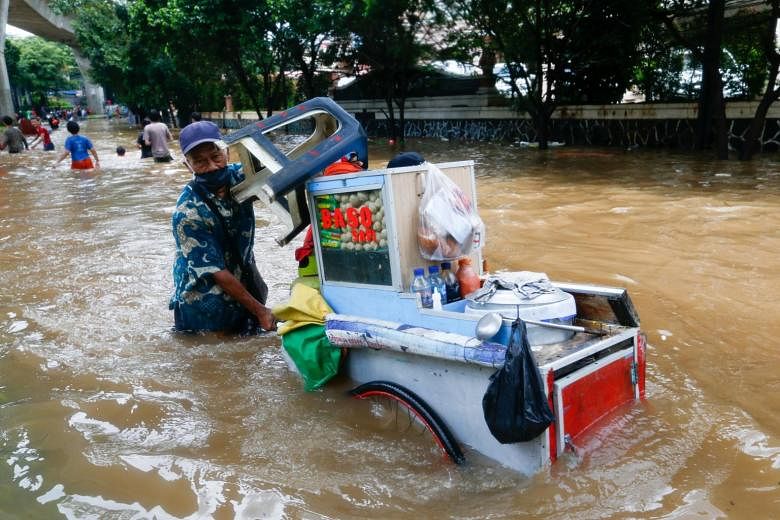NEW YORK (THOMSON REUTERS FOUNDATION) - Nearly nine in 10 leading global climate economists think climate change will deepen income inequality between rich and poor countries, with most calling for urgent action to cut planet-warming emissions, a survey showed on Tuesday (March 30).
The impacts of rising temperatures could create "enormous difficulties" for nations already burdened by economic challenges and high rates of poverty, said the research by New York University's Institute for Policy Integrity.
In the largest ever global expert survey published on the economics of climate change, nearly three-quarters of the more than 730 respondents said "immediate and drastic action" was needed to cut emissions.
The findings come as nations update their plans to reduce emissions ahead of November's UN COP26 summit, to meet the 2015 Paris accord of limiting the rise in average temperatures to 1.5 deg C above pre-industrial levels.
Economists think governments may be underestimating the potential costs of climate change, such as the impact of extreme weather and economic disruption, as they weigh up the costs of policies to reduce emissions, the authors said.
"There seems to be extremely high concern about the risks of climate change," said Mr Derek Sylvan, the institute's strategy director and co-author of the survey, which interviewed economists published on climate issues in top-ranking journals.
According to a consensus in the survey, projected economic damage from climate change is estimated to reach US$1.7 trillion (S$2.9 trillion) per year by 2025 and about US$30 trillion annually by 2075, if the current warming trend continues.
The most severe impacts will be felt in developing countries, due to factors such as higher dependence on agriculture and vulnerability to extreme heat, Mr Sylvan told the Thomson Reuters Foundation He said the costs would be felt worldwide, due to spillover effects such as the disruption of trade routes and supply chains, and refugee crises caused by climate impacts.
In the survey, 70 per cent of respondents also anticipated that climate change would increase inequality within countries, widening the gap between the poorest and richest thirds of national populations.
The authors added that the cost of reducing emissions is dropping quickly as the price of solar and wind generation plummets, with 65 per cent of economists expecting similar cost-reduction patterns for other clean technologies.
"With the costs of clean technologies falling all the time, ambitious climate action is not just the right thing to do for the planet, it's the right move for the economy, too," said Mr Sam Hall, director of the Britain-based Conservative Environment Network, in a statement.
For another question on reaching net-zero emissions by 2050, two-thirds said the costs of investing towards that global goal would be outweighed by the economic benefits, which would include preventing natural disasters, preserving coastal infrastructure and assets and protecting food supplies.
To avoid catastrophic climate change, scientists say the world needs to reach net-zero emission by 2050 - meaning people are adding no more emissions to the atmosphere than they are removing.
Mr Sylvan said he was surprised that so many saw net-zero action as "economically desirable, even on the pretty short timeline that we're talking about".
Most of the international climate economists questioned for the survey in February said they had become more concerned about climate change over the last five years. The most common reason they gave was the escalation in recent extreme weather events, which have included climate-linked wildfires and heat waves.
The world saw more than 7,300 major natural disasters between 2000 and 2019, which killed some 1.2 million and cost US$3 trillion in damages, according to the UN Office on Disaster Risk Reduction. That compares with about 4,200 disasters, leading to 1.19 million killed and US$1.6 trillion in losses during the 20 years previous, the data show.
"Some places are more exposed, and current levels of income matter a great deal," said Mr Michael Greenstone, an economist at the University of Chicago and the director of the Energy Policy Institute at Chicago.

